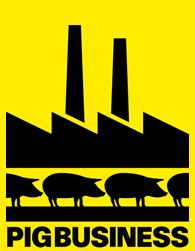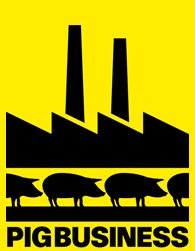
Ever feel like you were playing checkers and the other guy was playing chess?
That’s the impression I get when watching many of the recent spate of food documentaries. Activists announce that this or that is wrong with the food system; on the rare occasion when something appears to be getting done about it, the folks who are doing things badly simply change their tactics, not their strategy.
That’s how it’s gone with the British 2009 documentary film Pig Business. I watched this film in several 10-minute segments via YouTube (Part One) because it hasn’t been released in the U.S., primarily due to legal pressure brought upon the director (Tracy Worcester, who spent four years making the film) by the film’s main villain, Smithfield Foods. The world’s largest pork producer, Smithfield has 52,000 employees processing 27 million pigs per year in 15 countries, accruing annual sales around $12 billion. The UK’s Channel 4 ran the film last summer despite four letters from Smithfield threatening litigation, but since no U.S. insurer would back the film’s release here, it has become essentially a black-market film. Score another one for corporate censorship.
Smithfield does, in one sense, have cause for concern: this film certainly doesn’t show their company in the most favorable light. Right off the bat, the viewer is struck with some rather gruesome images of pigs being brutally mistreated, apparently at the hands of workers in Smithfield-run facilities. We hear from farmers and neighbors complaining of health problems that they tie to the fumes and water contamination from Smithfield hoglots. An owner of a small family farm in Poland who this large corporation has pushed out of business says, “I don’t know whether I should retire, hang myself, or leave the country.”
Watch the trailer:
In the early ’90s, there were 27,500 independent pig farmers in Poland. Today there are 2,200 hoglots, and 1,600 of them are wholly owned by Smithfield Foods. Each of those factory farms in Poland replaced 10 family farms with two to three minimum-wage jobs. Smithfield accountants and shareholders might laud the boost to the company’s bottom line, but one protester in the film asks a different question:
Why is it, when people are in bondage to their government it is called “tyranny,” but when the oppressor is a multinational corporation, it is called “efficiency?”
It was precisely this form of “efficiency” that the art and social critic John Ruskin had in mind when he said “There is scarcely anything in the world that some man cannot make a little worse, and sell a little more cheaply. The person who buys on price alone is this man’s lawful prey.”
Smithfield is not the only corporate specimen under Worcester’s microscope; she takes large financial institutions to task as well. In an interview with noted Belgian economist Bernard Lietaer, he points out that Big Finance has its fingers in absolutely everything—making one-third of all political contributions in the United States (a figure that is sure to only increase in light of the Supreme Court’s recent decision). Big Money’s influence, along with that of many other large and wealthy corporations, dictates the type and scope of laws throughout the U.S. and the world. My daddy used to call this the Golden Rule: He who has the gold makes the rules.
That influence is precisely what makes the competitive practices of Smithfield (not to mention many other agribusiness conglomerates) patently unfair. As Pig Business points out, if the likes of Smithfield had to pay for the damages they cause, to the environment and to human health, then any small farmer in the world could out-compete them. But they don’t, because the game is rigged.
So most of the time, agribusiness will take its profits and steam obliviously onward. But if anyone points out that the wreckage these companies leave in their wakes, they have scads of lawyers and PR professionals to make certain no one hears. Watching Pig Business on YouTube is one small way to get past their invisible hand.
Watch Part One of Pig Business >
A version of this post appeared on CivilEats.com.


